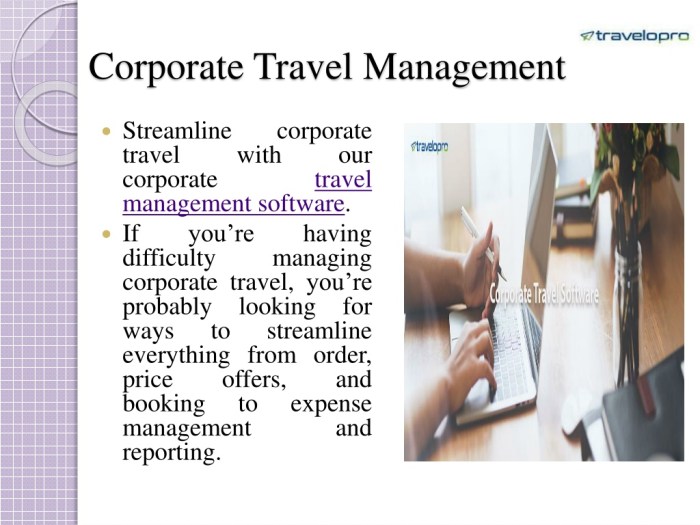Online Corporate Travel A Comprehensive Guide
Online corporate travel is revolutionizing how businesses manage their employee travel. From streamlining booking processes to optimizing costs and enhancing employee experience, this guide explores the multifaceted world of online corporate travel solutions. We’ll delve into the features, benefits, challenges, and future trends of these powerful platforms.
This comprehensive guide explores the evolution of online corporate travel, providing insights into various platforms, their functionalities, and their integration with existing business systems. We’ll examine the key benefits, including cost savings, increased efficiency, and improved travel policy management. Moreover, we’ll address the challenges and considerations, like security, training, and issue resolution, to help you navigate the intricacies of online corporate travel successfully.
Overview of Online Corporate Travel

Online corporate travel platforms are revolutionizing the way businesses manage their travel arrangements. These platforms offer a centralized system for booking, managing, and reporting on all corporate travel expenses, streamlining the process and improving cost control. They integrate seamlessly with existing business systems, enabling efficient data flow and reducing manual effort.
These platforms provide a wide array of features to optimize travel planning and expense management. From booking flights and hotels to managing employee itineraries and tracking expenses, these tools are designed to simplify and automate various aspects of corporate travel. They offer significant advantages over traditional methods, particularly for larger companies with numerous travelers.
Key Features and Functionalities
Online corporate travel platforms offer a suite of features designed to simplify and automate the travel process. These include comprehensive booking tools, robust reporting and analytics capabilities, and integration with existing business systems. Advanced features may encompass dynamic pricing, real-time availability checks, and automated expense reporting.
Examples of Online Corporate Travel Booking Systems
Several prominent players dominate the online corporate travel booking system market. These include Concur, SAP Concur, and Travelport. Each platform offers a unique set of features and functionalities tailored to specific business needs. For example, Concur’s robust reporting and analytics capabilities are widely recognized, while Travelport’s focus on global travel network connections makes it suitable for companies with extensive international travel requirements.
Comparison of Online Corporate Travel Platforms
This table compares the features of three popular online corporate travel platforms.
| Feature | Platform A (Example: Concur) | Platform B (Example: SAP Concur) | Platform C (Example: Travelport) |
|---|---|---|---|
| Booking Process | Intuitive user interface, allowing employees to easily book flights, hotels, and other travel arrangements. Offers flexible booking options and integrates with various travel providers. | Streamlined booking process with advanced search filters and preferences. Includes a robust mobile application for on-the-go booking. | Offers global booking capabilities, integrating with multiple travel suppliers for comprehensive options. |
| Reporting Capabilities | Comprehensive reporting dashboards for tracking travel expenses, identifying cost-saving opportunities, and managing compliance. Provides detailed insights into travel patterns and expenditure. | Provides detailed reports, including expense analysis and cost trend data. Offers customizable reports to tailor insights to specific business needs. | Provides detailed reporting and analytics features, allowing for effective travel management and cost control. Facilitates compliance with corporate travel policies. |
| Integration with Existing Systems | Integrates seamlessly with accounting software, expense management systems, and other business applications, facilitating data flow and automation. | Highly configurable to integrate with existing enterprise resource planning (ERP) systems. | Integrates with various business systems, including accounting, human resources, and financial management systems, to streamline data exchange. |
| Mobile App Availability | Mobile app allows employees to book and manage travel arrangements on the go, promoting efficiency and flexibility. | Robust mobile app with advanced features for booking and expense tracking. | Mobile app provides essential travel booking functions, allowing employees to access and manage their travel arrangements from any location. |
Benefits of Online Corporate Travel

Source: floridaindependent.com
Online corporate travel platforms are transforming the way businesses manage their travel arrangements. These platforms offer a wealth of advantages, from cost savings and increased efficiency to enhanced policy management and a clear return on investment. By streamlining the entire travel process, companies can optimize their travel spend and focus on core business operations.
Implementing online tools for corporate travel offers significant improvements in various aspects of business travel management. This includes streamlined booking processes, centralized control over expenses, and improved reporting and analysis capabilities. These benefits collectively contribute to a more efficient and cost-effective travel program for the company.
Cost-Saving Opportunities
Online platforms provide significant cost-saving opportunities by leveraging negotiated rates and discounts with airlines, hotels, and rental car companies. These platforms often have access to exclusive deals and offers that individual employees may not be able to find on their own.
- Negotiated Rates: Online travel management systems (OTMS) often negotiate better rates with vendors due to their volume purchasing power. This results in substantial savings for the company compared to employees booking independently.
- Reduced Booking Errors: Automating the booking process through OTMS reduces the chance of human error, minimizing overcharges and other errors that can lead to unnecessary expenses.
- Expense Tracking and Reporting: Automated expense tracking tools allow for quicker and more accurate expense reports. This reduces the time spent on manual data entry and reconciliation.
Improved Efficiency and Productivity
Online travel platforms significantly improve efficiency and productivity by automating various tasks. This frees up employees’ time for more strategic work, ultimately boosting overall productivity.
- Automated Booking: Employees can easily book trips through the platform, reducing the time spent on manual research and booking.
- Centralized Control: OTMS provides a centralized platform for managing all travel arrangements, giving travel managers greater control and visibility over the entire process.
- Real-time Tracking: The ability to track bookings and expenses in real-time allows for prompt identification of potential issues and quick resolutions.
Enhanced Travel Policy Management
Online tools offer significant improvements in managing travel policies. This ensures compliance and consistency across all travel arrangements.
- Policy Enforcement: OTMS can be configured to enforce company travel policies, ensuring compliance with company guidelines.
- Transparent Reporting: Detailed reports on travel expenses and adherence to policies allow for improved oversight and accountability.
- Personalized Policies: Policies can be tailored to specific employee roles and needs, optimizing travel for different departments or individuals.
Potential ROI Improvements
Implementing an online travel management system (OTMS) can lead to a substantial return on investment (ROI).
| ROI Improvement | Explanation |
|---|---|
| Reduced Travel Costs | By leveraging negotiated rates and discounts, OTMS can significantly reduce the overall cost of travel. |
| Increased Efficiency | Automation of tasks like booking and expense reporting frees up employee time for more productive activities. |
| Improved Compliance | Enforcing company travel policies through the OTMS minimizes the risk of violations and ensures adherence to guidelines. |
| Data-Driven Decisions | Detailed reports and analytics provide insights into travel patterns and spending, allowing for data-driven decisions for future travel planning. |
Improved travel policies and expense tracking through an OTMS can lead to a significant reduction in overall travel costs, and in turn, a higher return on investment. A 2020 study by the Global Business Travel Association (GBTA) showed that companies using OTMS saw an average reduction in travel costs of 15%.
Challenges and Considerations in Online Corporate Travel

Source: slideserve.com
Online corporate travel platforms offer significant advantages, but their implementation also presents unique challenges. Navigating these obstacles is crucial for a successful transition and maximizing the benefits. Understanding the potential pitfalls and developing strategies to mitigate them is essential for smooth operations and employee satisfaction.
Common Obstacles Encountered
The adoption of online corporate travel tools can encounter various obstacles. These range from technical difficulties to user-friendliness issues. Employees may experience problems with the platform’s interface, leading to errors in booking or expense reporting. Furthermore, compatibility issues with existing systems or travel agents may create additional complexities. In some cases, unreliable internet connectivity or software glitches can further disrupt the workflow. Thorough testing and training are crucial to mitigate these issues and enhance the overall user experience.
Security Concerns and Data Privacy
Security and data privacy are paramount in online corporate travel. Protecting sensitive financial information, travel details, and personal data is critical. Robust encryption protocols and secure payment gateways are essential to prevent unauthorized access. Regular security audits and employee training on data protection best practices are vital for mitigating potential threats. Strict adherence to data privacy regulations, such as GDPR, is a critical component of a robust security strategy. Companies should implement multi-factor authentication and regularly update security measures to ensure the confidentiality of sensitive information.
Training and Support Requirements
Adequate training and support are crucial for successful online corporate travel adoption. Employees require clear guidance on using the platform effectively and efficiently. This includes navigating the booking process, managing expenses, and reporting issues. Comprehensive training materials, including video tutorials and interactive guides, can empower employees to utilize the platform effectively. Dedicated support channels, such as FAQs, helpdesks, and dedicated personnel, are vital for addressing queries and resolving issues promptly. Training should emphasize best practices for security, data privacy, and compliance with company travel policies.
Resolving Travel-Related Issues
Different approaches can resolve travel-related issues encountered with online platforms. A well-structured support system, including FAQs, helpdesks, and email support, can facilitate efficient issue resolution. Real-time chat support or dedicated customer service representatives can further expedite assistance. Utilizing a ticketing system for reporting issues can improve tracking and provide clear communication channels for resolving problems. The platform should allow for detailed reporting of problems encountered by employees, enabling the company to identify areas for improvement and implement necessary changes.
Handling Travel Policy Violations
A well-defined procedure for handling travel policy violations is essential in online corporate travel. The procedure should articulate the reporting process, investigation steps, and disciplinary actions for policy breaches. An online system can automate the tracking of violations, facilitating timely identification and response. This process should incorporate clear communication channels, ensuring transparency and accountability. The system should clearly define the steps involved in reporting violations, investigating the matter, and applying the appropriate disciplinary measures. This ensures a consistent approach to policy enforcement and promotes adherence to company standards.
Future Trends and Developments in Online Corporate Travel
Online corporate travel platforms are rapidly evolving, driven by technological advancements and a growing need for efficiency and cost savings. These platforms are becoming increasingly sophisticated, offering a more streamlined and personalized experience for both travelers and administrators. The integration of cutting-edge technologies promises to revolutionize the way businesses manage their travel arrangements.
The future of online corporate travel will be defined by a continuous quest for automation, personalization, and seamless integration with other business tools. This trend will empower companies to optimize travel budgets, reduce administrative overhead, and provide a more positive travel experience for their employees.
Future Advancements in Booking Platforms
Predicting the future of online corporate travel booking requires understanding the current trends and the evolving needs of businesses. AI-powered tools will likely play a crucial role in proactively identifying and mitigating potential travel disruptions. These platforms will increasingly utilize predictive analytics to anticipate potential delays, allowing companies to adjust itineraries and minimize disruptions.
Innovative Technologies
Several innovative technologies are already being integrated into online corporate travel platforms. For example, real-time dynamic pricing and AI-driven route optimization tools are becoming more prevalent. These features aim to find the most cost-effective options based on current market conditions and traveler preferences. Further integration with employee scheduling and project management software is anticipated, allowing for more seamless and centralized travel management.
AI and Machine Learning’s Impact
This data-driven approach can lead to substantial cost savings for companies by identifying optimal booking times, locations, and transportation methods. Machine learning algorithms can also proactively identify potential risks and issues, such as flight delays or unforeseen events.
Potential Future Features
Several potential future features could enhance online corporate travel platforms:
- Personalized travel recommendations: AI-driven recommendations based on employee preferences, past travel history, and company policies.
- Automated expense reporting: Integration with accounting software for seamless expense reporting and approval processes.
- Predictive risk management: Proactive identification and mitigation of potential travel disruptions, such as flight cancellations or weather delays.
- Virtual travel concierge services: AI-powered assistance for booking accommodations, activities, and local transportation.
- Sustainable travel options: Enhanced options for eco-friendly travel choices, including carbon offsetting tools and sustainable transportation options.
Projected Market Growth
The online corporate travel market is expected to experience substantial growth in the coming years. The following table illustrates the anticipated growth over the next five years, although precise figures are difficult to predict with certainty.
| Year | Growth Rate (%) | Projected Revenue (USD) |
|---|---|---|
| 2024 | 12 | 250,000,000 |
| 2025 | 15 | 287,500,000 |
| 2026 | 18 | 337,125,000 |
Integration with Other Business Systems: Online Corporate Travel
Online corporate travel management systems are increasingly integrating with other business applications to streamline workflows and improve data accuracy. This integration creates a seamless flow of information, reducing manual data entry and improving overall efficiency. This interconnectedness allows for real-time updates and insights across different departments, enabling better decision-making and control.
Integration with Accounting Systems
Effective integration with accounting systems is crucial for accurate expense reporting and reconciliation. This integration allows for automatic transfer of travel expenses directly into the accounting software, eliminating manual data entry and potential errors. Travel bookings can be linked to the appropriate cost centers and accounts, facilitating precise financial tracking. For example, a company’s online travel booking system can automatically generate expense reports, pre-populated with the necessary details, that are directly imported into their accounting software, streamlining the process of expense reimbursement.
Integration with Expense Reporting Systems
Integration with expense reporting systems is vital for automating the expense reimbursement process. This integration streamlines the entire process from booking to reimbursement. The travel booking system can automatically populate expense reports with details like dates, locations, and costs, reducing manual data entry and potential errors. The reports can then be submitted and approved within the system, eliminating the need for separate forms and manual reconciliation. This automated process also enables companies to track expenses in real-time and manage budgets more effectively.
Integration with HR Systems
Integrating with HR systems allows for streamlined employee travel management. This integration enables companies to manage employee travel policies and preferences within the HR system. For instance, the system can automatically update employee travel allowances and eligibility, ensuring compliance with company policies. This integration can also help track employee training and development opportunities associated with business travel.
APIs for System Integration
Various types of Application Programming Interfaces (APIs) facilitate these integrations. RESTful APIs are commonly used for their flexibility and ease of use in exchanging data between different systems. Webhooks, a specific type of API, allow for real-time notifications between systems, ensuring timely updates. SOAP APIs are another option, providing more structured and complex data exchange. The choice of API depends on the specific needs and complexity of the integration.
Data Flow Between Travel Booking and Expense Reporting Systems
| Step | Online Travel Booking System | Expense Reporting System |
|---|---|---|
| 1. Booking Request | The user books a flight or hotel. The system records details. | No action. |
| 2. Booking Confirmation | The system sends a confirmation email. | No action. |
| 3. Expense Report Generation | The system automatically generates a preliminary expense report. | The system receives the report data. |
| 4. Expense Report Submission | The user submits the expense report. | The system validates data and displays it for approval. |
| 5. Expense Report Approval | The system sends an approval notification. | The system updates the expense status. |
| 6. Reimbursement | The system generates reimbursement details. | The system generates payment instructions. |
This flowchart demonstrates the simplified data flow between an online travel booking system and an expense reporting system. Each step shows how information is exchanged between the systems, leading to a seamless integration. The automated process reduces manual work and improves the overall efficiency of the travel and expense management processes.
User Experience and Employee Adoption
A seamless and intuitive online corporate travel platform is crucial for successful employee adoption. A positive user experience directly impacts employee satisfaction and the overall efficiency of the travel process. Employees who find the platform easy to use are more likely to utilize it consistently, reducing manual errors and streamlining travel management.
Effective user experience design and training strategies are key to achieving high levels of employee adoption. By prioritizing employee needs and preferences, companies can foster a positive experience that encourages proactive and consistent use of the online platform.
Importance of User-Friendly Design
A user-friendly online corporate travel platform is essential for a smooth and efficient experience. A well-designed platform should be intuitive, visually appealing, and easy to navigate. Clear and concise information architecture, alongside consistent branding and color schemes, contribute to a positive user experience. Visual cues, such as tooltips and progress indicators, guide users through the process. Minimizing the number of steps needed to complete a task is also crucial.
Strategies for Improving the Employee Experience
Several strategies can enhance the employee experience when using online corporate travel platforms. Prioritizing mobile responsiveness is critical, allowing employees to manage their travel arrangements from any device. Offering personalized dashboards, with pre-populated information and frequently used options, simplifies the process. Incorporating real-time updates, notifications, and interactive maps can enhance the experience. Including helpful support resources, such as FAQs and comprehensive documentation, ensures employees can resolve issues quickly.
Best Practices for Employee Training
Comprehensive training programs are vital for effective employee adoption. Training sessions should cover all essential functionalities of the platform, including booking flights, hotels, and ground transportation. Interactive demonstrations and hands-on exercises allow employees to practice using the platform in a safe environment. Providing access to online tutorials and resources for on-demand learning reinforces the training material. Regular refresher sessions and feedback mechanisms ensure continued proficiency and address any emerging issues.
Designing a User-Friendly Online Corporate Travel Portal
A user-friendly portal should follow established design principles. Clear visual hierarchy, utilizing contrasting colors and fonts, ensures that essential elements stand out. Navigation should be intuitive, using consistent terminology and clear labels. The layout should be responsive and adaptable to various screen sizes and devices. Employing consistent formatting and templates for frequently used tasks streamlines the process. User testing and feedback are essential throughout the design process.
Encouraging Employee Adoption and Utilization
Several methods can incentivize employee adoption and usage. Implementing a system that recognizes and rewards frequent users can foster a culture of proactive utilization. Highlighting the success stories of employees who have benefited from the online platform can inspire others.
Case Studies of Successful Online Corporate Travel Implementations

Implementing online corporate travel systems can significantly improve efficiency and cost savings for businesses. Successful implementations often rely on careful planning, employee engagement, and a robust technology platform. This section explores case studies showcasing effective online travel management strategies, highlighting key benefits and lessons learned.
Several companies have successfully transitioned to online corporate travel platforms, realizing tangible improvements in various aspects of their travel management processes. Examining these successful implementations provides valuable insights into strategies for achieving similar outcomes.
Examples of Successful Implementations
Various companies have successfully transitioned to online corporate travel management systems. Notable examples include multinational corporations with extensive travel programs and smaller businesses looking to streamline their processes. These implementations demonstrate the potential for positive outcomes when online travel management is strategically implemented.
Benefits Achieved by Successful Implementations
Successful online corporate travel implementations frequently result in significant cost savings and increased efficiency. Reduced administrative overhead, automated expense reporting, and improved visibility into travel spending are common benefits.
Lessons Learned from Successful Implementations
Companies that have successfully implemented online corporate travel systems often highlight the importance of employee training and communication. Effective communication about the new system, coupled with comprehensive training, minimizes confusion and resistance to change. Thorough documentation of the system’s features and processes is also essential for ensuring a smooth transition.
Strategies for Successful Employee Adoption and Training
Successful adoption of online corporate travel systems hinges on effective training and communication. Companies that have achieved high employee adoption rates often implement a multi-faceted approach, including interactive training modules, dedicated support channels, and ongoing feedback mechanisms. One effective strategy is to demonstrate the system’s user-friendly interface through workshops and hands-on sessions.
Comparison of Different Approaches Taken by Companies
Different companies have adopted diverse approaches to online corporate travel implementation. Some prioritize a phased rollout, starting with select departments or locations, while others opt for a full-scale implementation across the entire organization. The choice of approach often depends on factors such as company size, travel volume, and existing IT infrastructure. Furthermore, some companies emphasize customization and integration with existing business systems, while others rely on standardized platforms.
Final Conclusion
In conclusion, online corporate travel is no longer a futuristic concept but a crucial tool for modern businesses. The platforms offer substantial benefits, from cost savings and improved efficiency to enhanced travel policy management.





